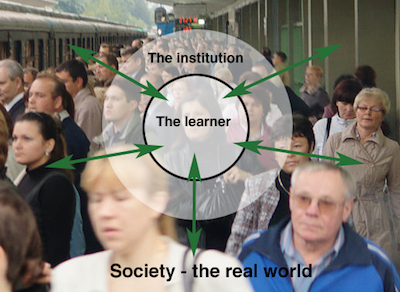Action competence
| Learning and Teaching in Practice | |
|---|---|
| Module 5: Teaching philosophy | |
| Action competence | Introduction | Models of action competence | Summary |
Action competence is defined as: “an individual’s capacity of critically selecting and conducting possible actions that may solve societal problems through democratic mechanisms" (Odabaşı, Kurt, et al., 2011, p. 1).
Action competence, what it means and the importance for education is explored. A scenario with Brett illustrates a practical application of action competence.
In education, when democratic principles are used individuals can decide how, when, what, where and with whom they learn, and they are able to contribute equally to decisions about their learning. Therefore, they have shared responsibility and freedom in their choice of activity to achieve their goals for learning. Theories and thinking about democratic education originated with John Dewey.
Why is action competence important?
When action competence is applied to education, a problem-oriented approach to learning is taken, and through action learning, real society-changing solutions are found for the issues that emerge. Therefore, activities for the 'sake of them' are not undertaken, rather authentic learning opportunities are engaged in.
Skills of critical analysis, inquiry, reflection and having a vision for a future where societal issues are resolved through collective action are key. According to Jeffrey (2011), "the ability to be constructive in the change process at a societal level determines an individual’s action competence" (p. 9). Therefore, collaboration on solving issues will require a degree of interaction with others and as such becomes a social learning situation. The cultural influences that shape the learning experience are also important to build action competence.
|
Brett has decided it would benefit students in his department if they could take part in more authentic learning situations outside of the institution. And he's keen to arrange something which would be of real benefit to society as well. Brett finds the ideal solution - the local branch of an international not-for-profit organisation that builds houses for those that couldn't otherwise afford them. The carpentry students have agree to take part as voluntary workers when the organisation builds a new house - these learners will benefit from the 'real world' experience and have the satisfaction and motivation of knowing their involvement is contributing to society as well. There may be a little extra work in organising this real-world learning but Brett feels sure the benefits will greatly outweigh this. |
Reference
- Jeffrey, H. (2010). Student-centred learning: options for the application of constructivist thinking in occupational therapy education. School of Occupational Therapy, Otago Polytechnic, Dunedin. Student-centred learning

- Odabaşı, H., Kurt, A. et al. (2011). ICT action competence in teacher education. EDULEARN11 Proceedings. Retrieved from http://library.iated.org/view/ODABASI2011ICT

